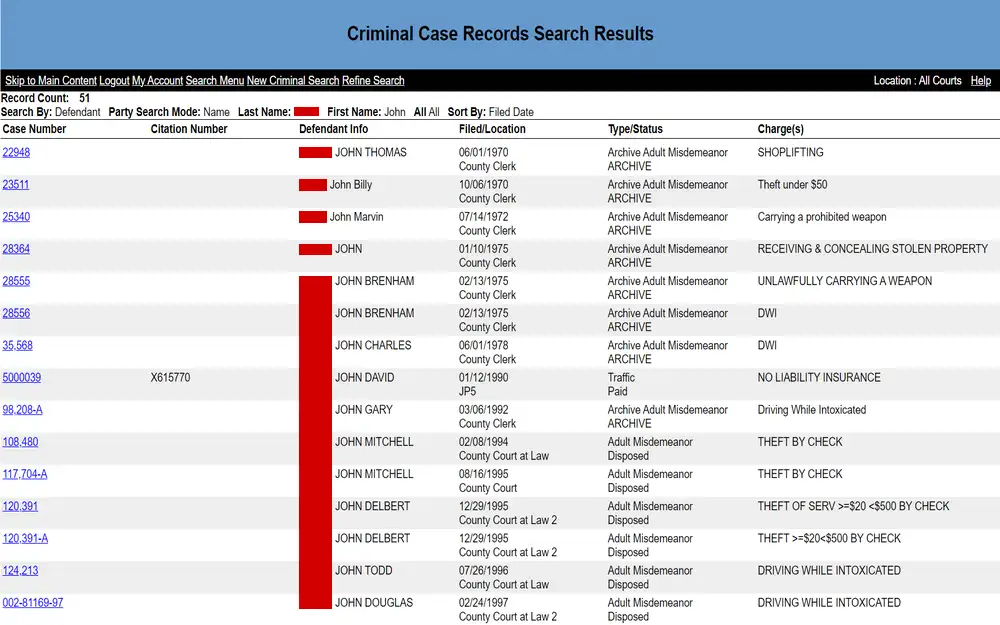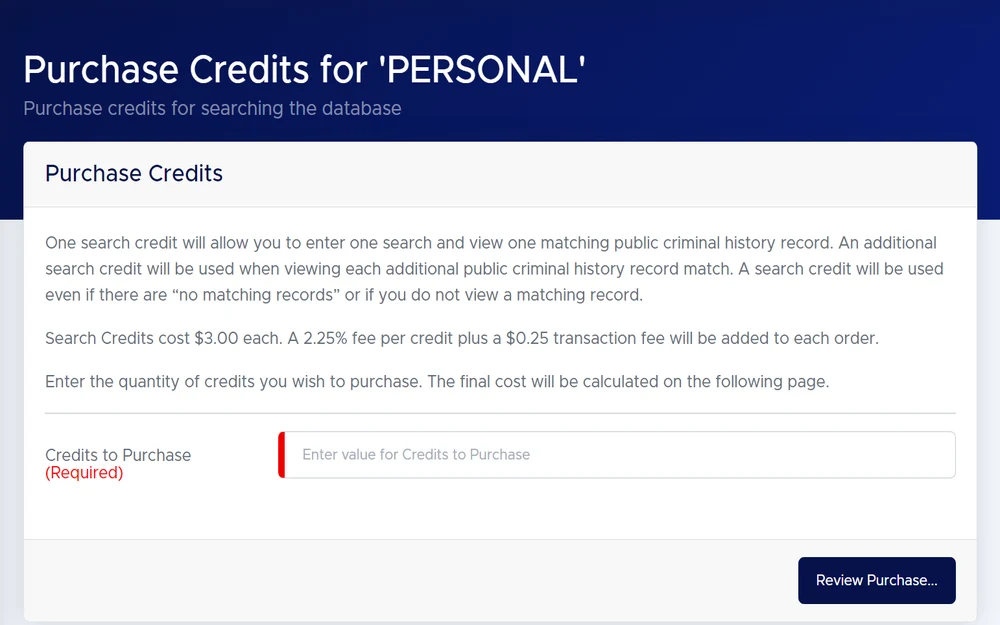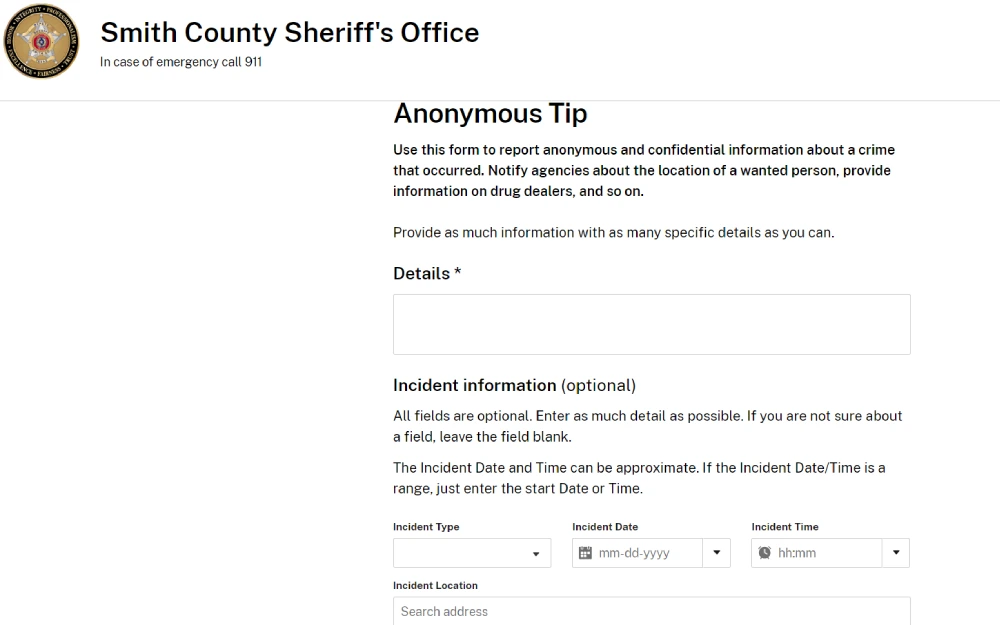Run a free Smith County warrant search to uncover more about anyone wanted locally.
Interested parties in Smith County, Texas, can obtain records of active warrants at no cost. Anyone can use this information to help themselves or those they care about find and resolve warrants or report a fugitive to the authorities.
Check out this brief resource today for links to the most convenient search tools and contact information for warrant record custodians in Smith County.
Information Necessary To Find Warrant Details for Free in Smith County Texas
Record seekers can find warrants and many other documents are considered as public records under the Texas Government Code Chapter 552, known as the Public Information Act.1 This means that records custodians have to make these records available to interested parties regardless of the reason for seeking them.
“Warrant” is a generic term for multiple types of documents that show a court order to apprehend or search a person or property. Warrants are usually publicly available, but the exact way to find the record varies in each jurisdiction.
Typically, counties provide this information via online portals, by phone, or by email. On occasion, warrants will be sealed if the information compromises an ongoing law enforcement investigation and is ordered to be withheld by the Attorney General.
Before searching, interested parties will need to know some basic information about the person in question. Minimally, researchers should know the first and last name of the person and where the warrant was issued. With this information, you can seek the record from the proper custodian.
The primary sources of records are the Smith County Clerk, who organizes all criminal proceedings and warrants in the county and the Texas Department of Public Safety.
How To Check if Someone Else or Yourself Is Wanted (Smith County Warrant Search)
Warrant records can be found for free with a few search procedures. First, navigate to the Smith County District Court Records Inquiry system.2 First select the type of court.
When entering the type of court, note that warrants are usually issued by criminal courts, but can also by a civil court in some circumstances. Users then enter the first and last name of any individual and any court records will display.
Check for records that state warrants issued and click on the record to view the public information. This includes the person’s name, the date of the warrant, and the issuing agency.

For assistance, record seekers can call the Smith County Clerk’s Office at (903) 590-4605 or the Public Records Division at (903) 590-4688. Visitors can also arrive in-person at:
Smith County Clerk
200 E Ferguson St.
Tyler, TX 75702
Additionally, record seekers can try to obtain information from the Smith County Sheriff. Though there is no online search tool from the Sheriff, searchers can call the office at (903) 590-2661 or visit the office in person at:
Smith County Sheriff’s Office
227 N. Spring Avenue
Tyler, Texas 75702
Sometimes record seekers feel more comfortable going to a local police department to get information. Most local police stations also have access to warrant information through their own records or through the county database. For example, an interested party can contact the Tyler Police Department to gain access to the information.
Tyler Police Department
711 W. Ferguson St.,
Tyler, TX 75702
Phone: (903)-531-1057
Hours: 8:00 a.m. – 5:00 p.m
How To Perform a Statewide Warrant Search in Texas
Sometimes the warrant in question may have been issued in a different county in Texas. In these circumstances, the Texas Department of Public Safety (DPS) provides a search tool. Note that this feature requires that users create an account and password, so you will not be anonymous.
To begin searching the Texas records, visit the Computerized Criminal History System (CCH) and follow the link to create an account.4 With the account, you can then search the database.
Once an account has been created, click on “Search Database”. You can find criminal records, proceedings, and warrants issued.
For assistance, you can call (855) 481-7070 or send a form response. All the searches are subject to fees, which are paid through site credits. The current cost is $3 per credit, which is good for one search and record. Interested parties can also visit the DPS at:
Texas Department of Public Safety
5805 North Lamar Blvd
Austin, TX 78752-4431

Written inquiries can be sent to a different mailing address:
Texas Department of Public Safety
PO Box 4087
Austin, TX 78773-0001
Alternatively, record seekers can pursue the warrant information with any county clerk. You can find contact information for all of the county clerks in Texas to inquire about a warrant.
Researchers should understand that each clerk has different procedures and portals to find the information. However, each clerk is required to provide the records.
Different Kinds of Warrants & What Each Signifies
Warrants are any documents that give law enforcement the right to search, seize, or detain a person or property. While some warrants are issued to apprehend suspects in serious crimes and felonies, others are issued for other matters like failing to appear or unpaid fines.
Note that any kind of warrant might also be referred to as an “active warrant”. This means that the warrant is still in effect and has not been resolved.
Arrest Warrants: Orders sent out by criminal court judges to place someone under arrest because they are accused of a crime.
Bench Warrants: These are issued when an individual fails to appear at a mandatory court hearing. They allow law enforcement to seize the persona and bring them to the court to appear before the judge.
Fugitive Warrants: Any warrant issued to arrest someone who has fled the jurisdiction to avoid being arrested or tried. Fugitive warrants also usually include extradition orders, which tell law enforcement who might apprehend the fugitive how far away the Smith County Sheriff is willing to travel to bring back the fugitive to the original court for trial.
Search Warrants: These apply to property. A search warrant gives law enforcement the right to search through belongings, homes, vehicles, or other personal possessions to look for evidence of a crime.
Probation & Parole Violation Warrants: These warrants are issued only for those under a supervised release program. Typically, this occurs if the person violates a condition of probation or parole such as missing mandatory meetings, using drugs or alcohol. Since the offender has been convicted and already is judged to be guilty, they have less rights and warrants are often issued without a long due process procedure.
Traffic Warrants: Local courts issue traffic warrants for non compliance with a ticket for a motor vehicle violation. Usually, this occurs when someone has an unpaid ticket or misses a court appearance for a serious traffic violation.
Child Support Warrants: Non-custodial parents often are required to make timely child support payments. If the payments are missed, the family court can order a child support warrant and bring the individual before the judge.
Capias & Capias Pro Fine Warrants: These are special warrants issued when the defendant accused of a serious crime fails to appear at the trial. Capias are usually no-bail warrants and result in the immediate detainment of the defendant for the remainder of the trial.
What To Do if You Have an Active Warrant in Smith County
Those seeking warrant information often discover one of these important orders is active for themselves, family members, or a suspicious person they encountered. The information is this resource will assist in finding the warrant, but it is paramount that something is done to resolve the situation.
Record seekers might find out that they have a warrant out for their apprehension. It is wise to immediately contact a lawyer who can represent you, give you advice, and help you resolve the warrant.
Depending on the circumstance, you might be able to resolve the situation before you are taken into custody. Additionally, make contact with a bail bond company who can help you post bail if you are taken into custody.
Depending on the underlying reason for the warrant, wanted individuals can often solve the problem by paying a fine or agreeing to a court date. For more serious crimes or failure to report to a criminal trial, it is likely to be taken into custody. Your lawyer and bail bondsperson can help you prepare and post bail.
If you are helping a friend or family member who has a warrant out, it is a serious situation. Make sure you record the information such as what type of warrant it is and what court or agency issued the warrant. Provide them the information, then strongly suggest they contact an attorney for advice about how to best resolve the warrant.
Alternatively, searchers may be suspicious or scared of someone and then find out they have a warrant out. It is very important to stay safe. Never attempt to apprehend the individual.
Instead, contact law enforcement to provide the wanted person’s name and location. You can enter an online Anonymous Tip to the Smith County Sheriff’s Office.6 Additionally, you can call the Smith County Crime Stoppers at (903) 597-2833 or (903) 531-1069.

If you are the wanted person, make sure to contact a lawyer and bail bondsperson for advice. Ultimately you may have to surrender to the Sheriff for arrest and detainment. You can turn yourself in at:
Smith County Sheriff
227 N. Spring Avenue
Tyler, Texas 75702
Warrants can be issued for a variety of violations, including crimes, failure to appear, or unpaid fines. Regardless of the reason for a warrant, it is always an important matter.
Interested parties can find warrant information and take steps to resolve them; start that process by following the steps in this resource to perform a Smith County warrant search.
References
1Texas Legislature. (2023). Open Government; Ethics. Public Information. Retrieved March 6, 2024, from <https://www.statutes.legis.state.tx.us/Docs/GV/htm/GV.552.htm>
2Smith County Judicial Records. (n.d.). Smith County Court Records Inquiry. Retrieved March 6, 2024, from <https://judicial.smith-county.com/PublicAccess/default.aspx>
3Smith County Judicial Records. (2024). Criminal Records. Retrieved March 6, 2024, from <https://judicial.smith-county.com/PublicAccess/Search.aspx?ID=100>
4Texas Department of Public Safety. (n.d.). Search for individuals in the Computerized Criminal History System (CCH). Retrieved March 6, 2024, from <https://publicsite.dps.texas.gov/ConvictionNameSearch/>
5Texas Department of Public Safety. (n.d.). Purchase Credits. Retrieved March 6, 2024, from <https://publicsite.dps.texas.gov/ConvictionNameSearch/Application/Purchase>
6CityProtect. (n.d.). Anonymous Tip. Retrieved March 6, 2024, from <https://cityprotect.com/forms/smith-county.com/anonymous>
